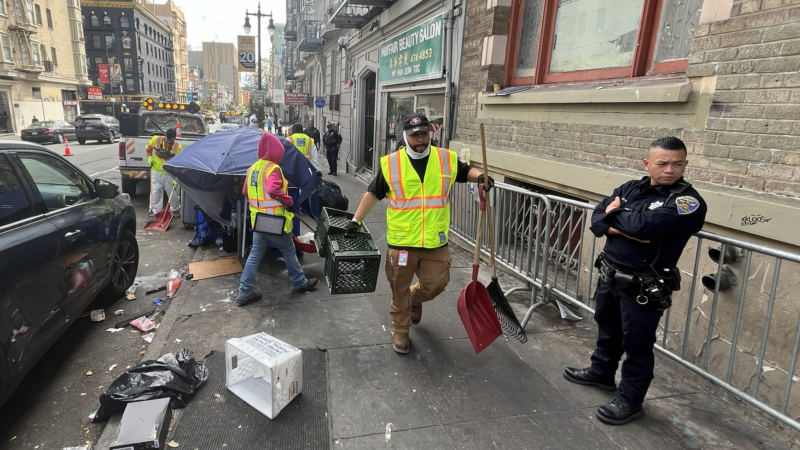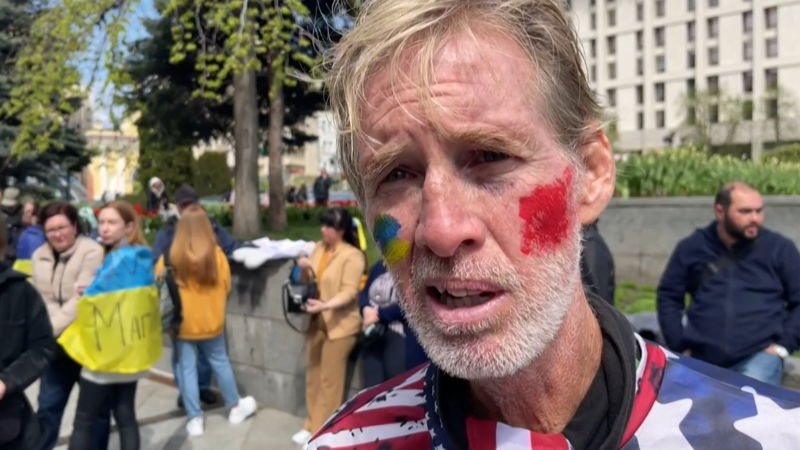San Francisco ramps up policing of homeless camps, with the Supreme Court’s blessing
California, home to the country’s largest homeless population, is in the midst of a crackdown on illegal homeless encampments. Over the summer, Gov. Gavin Newsom vowed to take a tougher line against illegal tents and structures on state property.
Some cities have followed suit. San Francisco Mayor London Breed, facing a tough reelection campaign, announced more “aggressive” sweeps in a city long known for extensive encampments.
This push comes after a Supreme Court ruling in June that upheld local laws criminalizing camping on public property. It overturned an earlier ruling by the 9th Circuit that had cast doubt on the constitutionality of enforcing such laws in Western states.

“It makes it easier for officers to do their jobs,” says San Francisco Police Chief William “Bill” Scott. “We still want to get people help if we can. But there are some street conditions that have to be addressed. And when people are camping on sidewalks illegally and interfering with the public’s access to those sidewalks and passages, we have the ability to now at least do some enforcement and to get people moved.”
In practice, that means San Francisco police are once again able to arrest people for violating a 19th century state law against “lodging” in a public or private place without permission. A tent on a sidewalk falls in that category, as do other structures.
“You trying to arrest me for having an umbrella and a tarp?” Jerry Henderson demands of two officers who have detained him. They’re accompanying city workers sweeping the sidewalks on Hyde Street in the Tenderloin neighborhood.
Henderson’s tarp — and a vintage PGA golf umbrella — are set up directly under a city notice giving 72 hours’ warning of the sweep. The officers try to calm him, asking an EMT to bandage his foot and offering him a couple of cigarettes. They give him a citation, release him, and allow him to drag away most of his possessions — minus the tarp, which has been impounded as evidence of a crime.
Activists for the homeless say the new emphasis on enforcement isn’t helping.
“It’s just like if I was carrying a bag full of my belongings down the street. The cops don’t have a right to take that out of my hands and trash it and crush it in front of me,” says Lukas Illa, with the Coalition on Homelessness, which has sued the city over encampment sweeps.
He says the Supreme Court’s ruling has effectively stripped homeless people of their Fourth Amendment protection against unreasonable search and seizure, because police are once again allowed to enforce the “illegal lodging” law.
“Now they have probable cause,” he says, “thanks to the Supreme Court.” He says the city’s strategy is “a carceral, criminalized one in which folks are just being arrested because they have nowhere else to go.”
But city officials say they do give people somewhere to go. The city crews sweeping the encampments include outreach specialists who offer services such as beds in emergency shelters. The police department now has its own allotment of emergency shelter beds, which officers can make available to people staying in illegal encampments.

“If you look at our tent counts, I do think the trend is going in the right direction,” says David Nakanishi, manager of the city’s Healthy Streets Operation Center. The city’s numbers show a steady decline in tents that started well before the Supreme Court’s ruling on enforcement.
“I think more and more it’s the tough cases we see out here. It’s the same people we see over and over again,” Nakanishi says.
Those people are now subject to the possibility of a cite-and-release arrest, with a required court date, as well as subsequent police visits to recently swept locations to prevent “re-encampment.”

Nakanishi says this increased enforcement can sometimes push the “tough cases” to accept help — particularly those who have become trapped by an accumulation of possessions.
“They’re so connected to their belongings, even though it’s things that are, basically most people would say, not just trash, but nasty trash,” he says. When enforcement causes them to “downsize” their possessions, he says, “I’ve seen people get freed up from that, to actually say, ‘Hey, now I can accept something.'”
That rings true to Fable Idris. He’s just been woken up by a city crew sweeping a street south of Market Street. He and his friends scramble to get their belongings together to stay ahead of the city’s power washers. Now he’s guiding the tail end of an impressive line of heavily loaded wheelchairs, shopping carts — even a cooler.
“It is a wagon train, yeah,” he says with a rueful laugh. “A lot of the stuff that we have, some of it might be more of a mental hoarding issue, you know? We’ve got to come to a real understanding at the end of the day that you can’t take it all with you.”

But Illa, with the Coalition on Homelessness, rejects the notion that it’s beneficial to enforce this kind of “downsizing.”
“Think about all the housed people that hoard and have so much. The only difference between them and unsheltered houseless people is the fact that they have a house to hide it all in,” he says.
He doubts this more vigorous enforcement is reducing the number of people living on the streets. While city workers believe there are fewer tents now, they’ve also noted an increase in the number of people living in vehicles.
An updated official count is expected in October — just weeks before the mayoral election.
Why the most climate-resistant glaciers are hiding in plain sight
In the American West, white glaciers and snow fields are outnumbered by long-overlooked “rock glaciers.” The rock covering these vast hunks of ice makes them far less affected by warming temperatures.
Ryan Routh pleads not guilty to attempting to assassinate former President Donald Trump
Shackled and dressed in khaki prison garb at a hearing in West Palm Beach, Fla., Routh also requested a jury trial. He faces four other charges, such as possession of a firearm by a convicted felon.
Ina Garten shares her secret for a great dinner party: 6 people and round table
"I like when everybody's knees are almost touching and it feels very intimate," the Barefoot Contessa host says. Garten's new memoir is Be Ready When the Luck Happens.
Israel conducts intel raids in southern Lebanon ahead of a possible ground invasion
Israeli commandos are conducting limited intelligence-gathering raids inside southern Lebanon, and that there are indications that Israel will be carrying out a limited ground incursion.
1972: “Watergate: Attempted Wiretapping”
Watergate: Attempted Wiretapping
What the Fed’s interest rate cuts mean for Massachusetts
When it comes to the Massachusetts economy, there are a couple industries that may get a particular boost from the Federal Reserve interest rate cuts.




